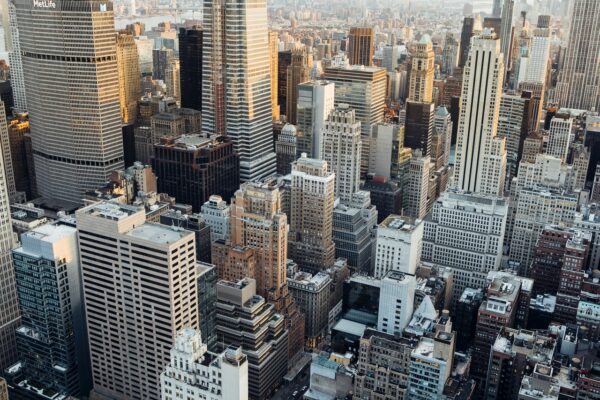By Venus Feng and Devon Pendleton
Billionaires the world over have flocked to London in recent decades, lured by its abundant luxury real estate and a long tradition of servicing the ultra-rich.
The relationship between the city and the super-wealthy is under increasing strain though. The government is poised to propose new anti-money laundering laws, empowering regulators to identify property owners and investigate wealth, while sanctions following Russia’s invasion of Ukraine could hit some of the city’s richest residents and their U.K. assets.

It risks a sharp reversal for the capital’s appeal as a destination for foreign money.
Last year non-U.K. buyers sunk more than $3 billion into London property, according to Knight Frank’s 2022 Wealth Report, the most cross-border private capital invested in real estate among places tracked by the broker, ahead of New York, the city with the greatest number of ultra-high net worth individuals, Paris, Tokyo and Singapore.
The report was based on data from 2021, before Russia’s invasion of Ukraine, which has triggered the worst geopolitical crisis in decades and roiled stock markets, especially Russia’s.
The wave of Russian money began to descend on London about two decades ago, as oligarchs sought to reinvest their cash spoils from privatized state assets in Western companies and trophy assets. Roman Abramovich bought soccer team Chelsea F.C. and so many stately mansions were acquired by Russians that the city earned the nickname “Londongrad.”
Popular areas include Eaton Square in Belgravia, sometimes termed Red Square, and St. George’s Hill in Surrey, a 964-acre (390-hectare) enclave where most homes are priced at more than 10 million pounds ($13.4 million).
Though Russians have remained important buyers, demand has waned since 2014 after the collapse in the ruble hampered buying power, according to Liam Bailey, global head of research at Knight Frank. Some of the most high-profile properties bought in recent years have been by Americans such as Ken Griffin, who paid 95 million pounds for a Georgian mansion near Buckingham Palace in 2019, and by the Chinese, like Cheung Chung Kiu who bought a Knightsbridge house for 210 million pounds in 2020.
“If Russian demand falls lower due to the current crisis, this is unlikely to have a substantial impact on market performance,” he said.
The war is however accelerating Prime Minister Boris Johnson’s intention to push forward legislation over a long-stymied register of overseas property owners as part of a push to sanction Russian elites and clamp down on money laundering. That could deter some buyers not just from Russia, but also China and other parts of the world, where buyers want secrecy.
For now, London is thriving as a destination for the super-rich, one of several cities globally that rebounded as investment destinations amid the recovery from Covid-19.
Prices of luxury homes surged by a record, driven by low interest rates, rising wages and a more flexible work environment, Knight Frank said. It was also generally a good time to be a billionaire. The world’s 500 wealthiest people added more than $1 trillion to their fortunes in 2021, according to the Bloomberg Billionaires Index, even as the pandemic raged on for a second straight year.
A surge in stock and house prices last year amid central bank easing led to a 9.3% jump in the number of ultra-high net worth individuals, defined by Knight Frank as those with $30 million or more in assets. North America led the gain, with its ultra-high-net worth population growing 12%, while those groups in Asia and Europe each grew by about 7%. Africa was the only region that saw a decline, with a 0.8% drop.
“Asset price rises, from property markets to equity markets and luxury collectibles, have all helped boost the fortunes of those wealthy enough to have investment portfolios,” said Flora Harley at Knight Frank, the report’s deputy editor.
This year has roiled that wealth creation. Even before the geopolitical tensions, equity markets were sliding because of concerns over rising interest rates, while China continued to push its “common prosperity” agenda.
Knight Frank predicts the number of ultra-wealthy will reach 784,000 by 2026, which would be a doubling over a decade, driven by Asia and Australasia. Governments, seeking to tackle wealth inequality, will raise levies on wealth, reducing the number of options for low-tax jurisdictions.
While the U.S. and U.K. were the most popular places for the ultra-rich to buy homes, prices climbed the highest in Dubai and Moscow, with gains of more than 40% in each city.
Provence, in the south of France, had the most diverse wealthy population, with people from 53 overseas nationalities owning property there, compared with 45 in London.
Neighboring Monaco meanwhile ranked first for relative cost, with $1 million buying less than 15 square meters (161 square feet) of prime real estate there, the least among the cities ranked. Hong Kong came in second with 21 square meters and London third with 31 square meters. In Sao Paulo, that amount bought 256 square meters.
More stories like this are available on bloomberg.com.




